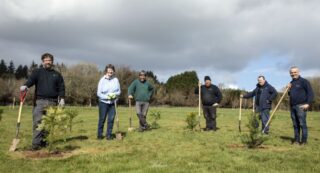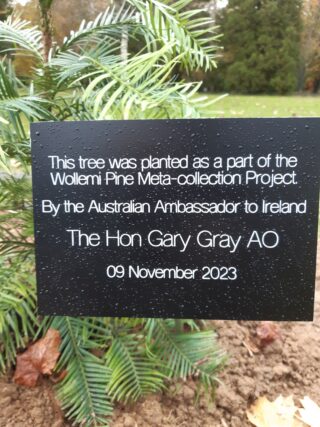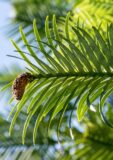In a world in which extinction and loss of plants and animals is a recurrent and depressing theme there are occasional glimmers of hope and examples of extraordinary survival. One such was the Wollemi Pine (Wollemia nobilis) of Australia, discovered alive in a remote gorge of Wollemi National Park and previously only known from 20 million year old fossils.

In 1994, David Noble, an Australian botanist, came across a group of trees in a remote gorge in Wollemi National Park in New South Wales, just 150km from Sydney. This chance discovery of the Wollemi pine, a distant relative of the Monkey Puzzle tree was a major botanical sensation. It was soon realised that it represented a wholly unknown living relative of a group of fossil trees dating back over 200 million year. The fact that only 89 individuals were known underlined their extreme vulnerability.
A major propagation project to replicate the trees and send them across the globe followed, with all proceeds being channelled into conservation measures within the Wollemi National Park of the Blue Mountains. As a conservation measure this has proved extremely successful in both ensuring the species survival, and discouraging collectors to search for the tree as it is now so readily available.
Unfortunately the risks of fungal disease to the native grove of 89 trees, as well the rise in bush fire intensity and prevalence, means that its long term security is still uncertain. Whilst we have been growing this species in Ireland for the past 19 years, both in botanic gardens and in private gardens, the planting of twelve new trees in Ireland in late 2023 represents an
exciting new chapter in conserving the Wollemi Pine.
Recent advances in DNA technology have, for first time, allowed the recognition of six distinct genetic strains amongst the surviving 89 wild trees. Formerly the population had been considered to lack any diversity at a genetic level.
In 2022, 174 young Wollemi pine trees, representing the six genetic strains grown by the Royal Botanic Gardens of Sydney were shipped from Australia. The trees were carefully looked after at Forestry England’s tree nursery at Bedgebury Pinetum in south east England. Six trees remain at Bedgebury, while the remaining trees have been distributed to 28 botanic gardens across the UK and Europe.
In 2023 the John F. Kennedy Arboretum, Co. Wexford, and the Kilmacurragh Botanic Gardens in Co. Wicklow were selected at suitable sites for this global conservation initiative. Twelve trees, representing two sets of each genetic strain were donated to the Office of Public Works – six to the JFK Arboretum and six to the Kilmacurragh Botanic Gardens. The twelve Wollemi Pine trees will be monitored, in collaboration/co-ordination with the other 28 European sites for the meta-collection.
The climate crisis means that across all continents many trees like Wollemi pines are facing urgent threats to their survival. We know that 34% of conifers are now endangered and our ongoing work to research, propagate and save tree species is more vital than ever. Growing genetically diverse plantings of these trees is vital to maximise their adaptive ability to climate change and crucial for the meaningful long-term success of restoration projects.

The importance of the JFK Arboretum has gained international standing in recent years. In addition to our participation in the Wollemi Pine meta-collection project the arboretum has made signification contributions to the International Conifer Conservation Programme – a global leader in study and conservation of endangered confer trees. In 2022 over 10 acres of new planting established some of the world’s most endangered conifers at the arboretum. Comprising of 1300 trees, representing 24 endangered conifer species the planting is the single largest planted collection of the International Conifer Conservation Programme in the world.
John F Kennedy Arboretum is one of the 32 National Historic Properties under the care of the Office of Public Works (OPW). Dr Matthew Jebb is the Director of the National Botanic Gardens sites including John F Kennedy Arboretum. Curator Dr Darach Lupton, Site Foreman Kevin Naughton and HEO Delia Hickey oversee the management and operations of the site.


